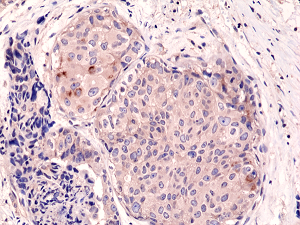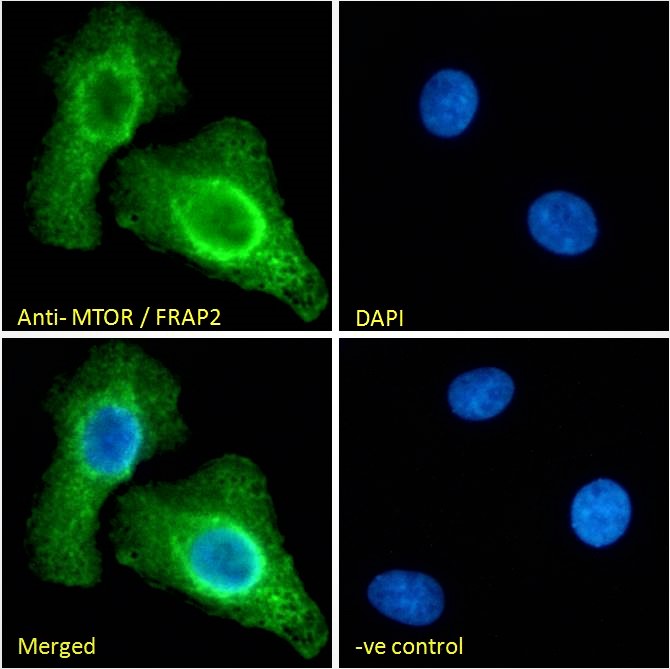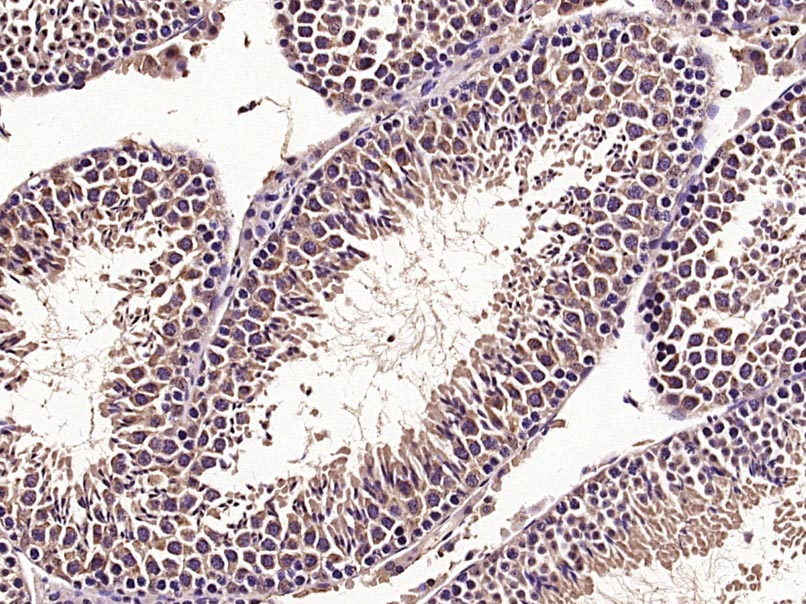
Immunohistochemical staining of formalin fixed and paraffin embedded human breast cancer tissue sections using Anti-mTOR Rabbit Monoclonal Antibody (Clone RM274) at a 1:1000 dilution.
anti-mTOR (human), Rabbit Monoclonal (RM274)
REV-31-1155-00
ApplicationsWestern Blot, ImmunoHistoChemistry
Product group Antibodies
ReactivityHuman
TargetMTOR
Overview
- SupplierRevMAb Biosciences
- Product Nameanti-mTOR (human), Rabbit Monoclonal (RM274)
- Delivery Days Customer2
- ApplicationsWestern Blot, ImmunoHistoChemistry
- CertificationResearch Use Only
- ClonalityMonoclonal
- Clone IDRM274
- Gene ID2475
- Target nameMTOR
- Target descriptionmechanistic target of rapamycin kinase
- Target synonymsFRAP, FRAP1, FRAP2, RAFT1, RAPT1, SKS, serine/threonine-protein kinase mTOR, FK506 binding protein 12-rapamycin associated protein 2, FK506-binding protein 12-rapamycin complex-associated protein 1, FKBP-rapamycin associated protein, FKBP12-rapamycin complex-associated protein 1, mammalian target of rapamycin, mechanistic target of rapamycin (serine/threonine kinase), rapamycin and FKBP12 target 1, rapamycin associated protein FRAP2, rapamycin target protein 1, tyrosine-protein kinase mTOR
- HostRabbit
- IsotypeIgG
- Protein IDP42345
- Protein NameSerine/threonine-protein kinase mTOR
- Scientific DescriptionMammalian target of rapamycin (mTOR) is a serine/threonine kinase that plays a key role in cell growth, cell proliferation, and protein synthesis. mTOR mediates phosphoinositide 3-kinase and Akt/PKB signaling, resulting in phosphorylation of 4EBP1, and initiation of mRNA translation. A second pathway involves regulation of ribosomal S6 kinase, which affects ribosome biogenesis and translation elongation. mTOR is phosphorylated at Ser2448 via the PI3 kinase/Akt signaling pathway and autophosphorylated at Ser2481. mTOR plays a key role in cell growth and homeostasis and may be abnormally regulated in tumors. Mutations affecting the gene results in Smith-Kingsmore syndrome. - Recombinant Antibody. This antibody reacts to human serine/threonine-protein kinase mTOR. This antibody may also react to mouse or rat mTOR, as predicted by immunogen homology. Applications: WB, IHC. Source: Rabbit. Liquid. 50% Glycerol/PBS with 1% BSA and 0.09% sodium azide. Mammalian target of rapamycin (mTOR) is a serine/threonine kinase that plays a key role in cell growth, cell proliferation, and protein synthesis. mTOR mediates phosphoinositide 3-kinase and Akt/PKB signaling, resulting in phosphorylation of 4EBP1, and initiation of mRNA translation. A second pathway involves regulation of ribosomal S6 kinase, which affects ribosome biogenesis and translation elongation. mTOR is phosphorylated at Ser2448 via the PI3 kinase/Akt signaling pathway and autophosphorylated at Ser2481. mTOR plays a key role in cell growth and homeostasis and may be abnormally regulated in tumors. Mutations affecting the gene results in Smith-Kingsmore syndrome.
- ReactivityHuman
- Storage Instruction-20°C,2°C to 8°C
- UNSPSC41116161








